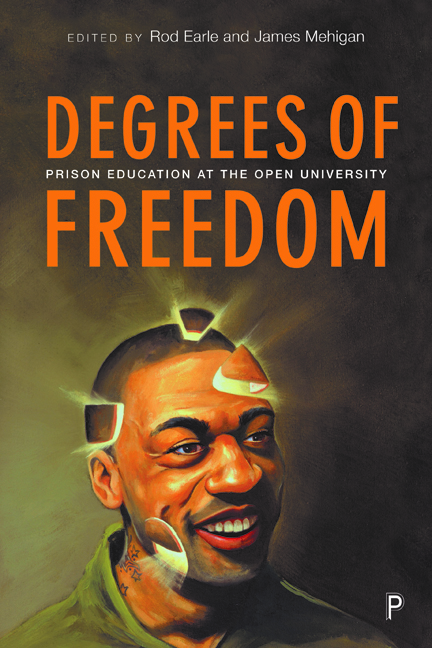Book contents
- Frontmatter
- Dedication
- Contents
- Notes on Contributors
- Acknowledgements
- 1 Openings and Introductions: Education for the Many, Prison for the Few
- 2 From Prisoner to Student
- Vignette 1 Choosing My Journey
- 3 Pioneers and Politics: Open University Journeys in Long Kesh During the Years of Conflict 1972–75
- Vignette 2 Avoiding the Mind-Numbing Vortex of Drivel …
- 4 A University Without Walls
- Vignette 3 Starting a New Chapter
- 5 Open Universities, Close Prisons: Critical Arguments for the Future
- Vignette 4 Out of the Abysmal
- 6 The Light to Fight the Shadows: On Education as Liberation
- 7 From Despair to Hope
- Vignette 5 Making my Commitment
- 8 Straight Up! From HMP to PhD
- 9 From Open University in Prison to Convict Criminology Upon Release: Mind the Gap
- Vignette 6 Message to a Prisoner
- 10 From the School of Hard Knocks to the University of Hard Locks
- 11 Becoming me with The Open University
- Vignette 7 Catching up with Kafka
- 12 From D102 to Paulo Freire: An Irish Journey
- Vignette 8 My Journey, My New Life
- 13 Ex-Prisoners and the Transformative Power of Higher Education
- Vignette 9 Prison Choices: Taking a Degree or Packing Tea?
- 14 What the OU did for me
- Appendix Study with The Open University
- Index
5 - Open Universities, Close Prisons: Critical Arguments for the Future
Published online by Cambridge University Press: 11 March 2021
- Frontmatter
- Dedication
- Contents
- Notes on Contributors
- Acknowledgements
- 1 Openings and Introductions: Education for the Many, Prison for the Few
- 2 From Prisoner to Student
- Vignette 1 Choosing My Journey
- 3 Pioneers and Politics: Open University Journeys in Long Kesh During the Years of Conflict 1972–75
- Vignette 2 Avoiding the Mind-Numbing Vortex of Drivel …
- 4 A University Without Walls
- Vignette 3 Starting a New Chapter
- 5 Open Universities, Close Prisons: Critical Arguments for the Future
- Vignette 4 Out of the Abysmal
- 6 The Light to Fight the Shadows: On Education as Liberation
- 7 From Despair to Hope
- Vignette 5 Making my Commitment
- 8 Straight Up! From HMP to PhD
- 9 From Open University in Prison to Convict Criminology Upon Release: Mind the Gap
- Vignette 6 Message to a Prisoner
- 10 From the School of Hard Knocks to the University of Hard Locks
- 11 Becoming me with The Open University
- Vignette 7 Catching up with Kafka
- 12 From D102 to Paulo Freire: An Irish Journey
- Vignette 8 My Journey, My New Life
- 13 Ex-Prisoners and the Transformative Power of Higher Education
- Vignette 9 Prison Choices: Taking a Degree or Packing Tea?
- 14 What the OU did for me
- Appendix Study with The Open University
- Index
Summary
Preamble: a moment of conference
When I started to attend criminology conferences nearly twenty years ago, I was treated to a rare moment of unintentional humour and collective self-awareness. In a large lecture theatre at the University of Portsmouth a rising academic star was presenting a paper on the penal climate in the Netherlands, renowned for its humane, parsimonious approach to incarceration. As Dr Francis Pakes put up a slide illustrating a newly built Dutch prison cell, chuckles could be heard rippling round the auditorium as academics recognised the cell's facilities and dimensions as almost completely identical to the university's student accommodation they had just vacated to attend the presentation. Like their rooms, the cell had an en-suite shower and toilet, a fitted single bed, work bench, wardrobe and storage facilities. Although delegates’ funny bones were tickled as they shared with each other the irony of their willingness to swap their conference accommodation for a prison cell, I felt an edge to this levity. Alongside these images a memory lurked; the cell I had been in some twenty years earlier in HMP Norwich had no sanitation and a battered steel bunk bed was crammed next to a single bed so as to accommodate three men in a cell designed nearly a hundred years earlier for a single prisoner.
The comparison entertaining the conference delegates was not lost on me but the apparent ease of the appraisal was troubling, the nerve it tickled also burned. It felt personally anchored in a serious criminological question, the one posed by Michel Foucault in the 1970s: ‘Is it surprising that prisons resemble factories, schools, barracks, hospitals, which all resemble prisons?’ (Foucault, 1979, p 228) Now, the relentless march of penal progress has advanced to include universities in this list of resemblances. And we find it more amusing than alarming.
In this chapter, James and I seek to extend the critical tradition of The Open University (OU) approach to questions of crime, punishment and social order by exploring the wider ramifications of imprisonment. We also seek to contextualise the OU's contributions to higher education in prisons and contribute to wider critical discussions about what universities are for (Collini, 2012; Connell, 2019; Dawson, 2019).
- Type
- Chapter
- Information
- Degrees of FreedomPrison Education at The Open University, pp. 73 - 94Publisher: Bristol University PressPrint publication year: 2019



